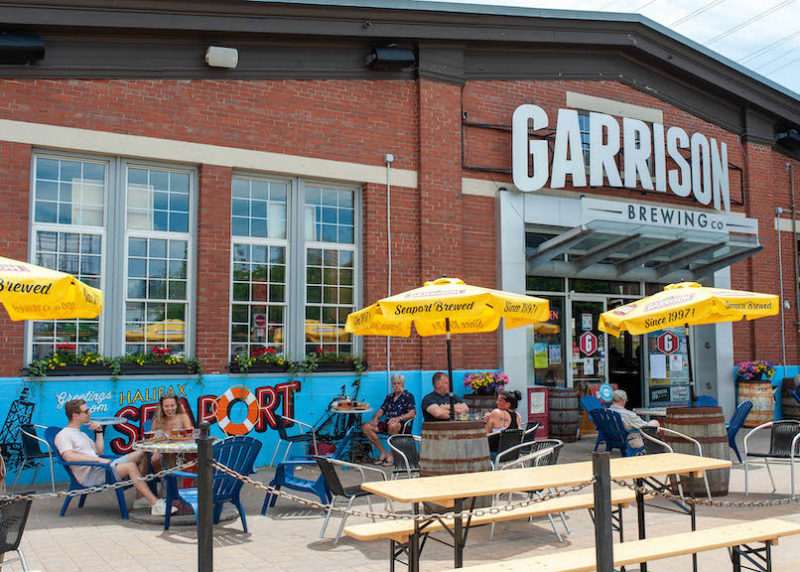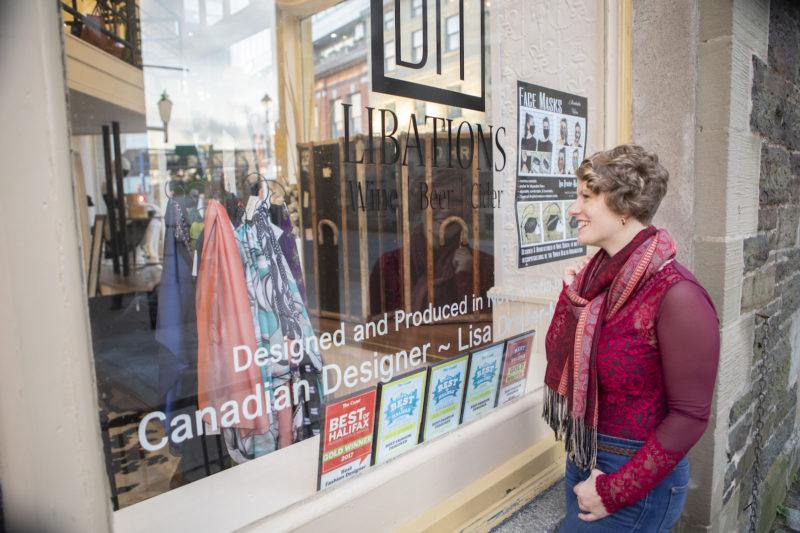Housing the entertainment sector with Neptune Theatre, the Halifax Convention Centre, Scotiabank Centre and 200 restaurants and bars, downtown Halifax represents more than a billion dollars of property assessment.
Home to NSCAD University and within close range of Saint Mary’s and Dalhousie Universities, the area is inhabited by an influx of students annually and more than 15,000 office workers (pre-pandemic). It also boasts the most visited tourist sites in the province: the Halifax Waterfront and Halifax Citadel National Historic Site.
Filled with unique and vibrant attractions, most of which are locally owned, downtown brings life to our city’s main streets––stretching all the way to the North End and across the bridge to Downtown Dartmouth. Together, this collective makes up the downtown core area offering exciting eatery, touring, and shopping experiences. It brings in tourists year after year while keeping the interest of locals.
“From an economic standpoint, there is no question that just as Halifax is the heart of Nova Scotia’s economic prosperity, downtown is the heart of Halifax’s economy,” says Paul MacKinnon, Chief Executive Officer of Downtown Halifax Business Commission.
The downtown core is key to the economic growth and prosperity of our city with its undeniable appeal as a destination for people to visit, gather, shop, discover and in turn, spend.
With 12 Business Improvement Districts across Nova Scotia collectively representing more than 4,000 businesses, the downtown core is supporting small business through economic recovery.
“Small businesses truly are the backbone of our economy,” says Tracy Jackson, North End Business Association Executive Director. “Not only do they make up the lion’s share of employers in Nova Scotia, but they also provide innovation, inspire growth and keep money close to home in our neighbourhoods and communities.”
In continued support of small business and economic recovery efforts for all sectors, the area has recently been undergoing noteworthy transformations. It’s cultivating a diverse makeup of storefront offerings, while driving growth and prosperity with new and improved directions for expansion.
Transforming the downtown core
“The pandemic gave us, as a city, license to move things forward quicker, and take a few more risks,” says MacKinnon. “We saw this from the municipal government with changes made to more pedestrianized streets, such as Argyle Street, Grafton Street, and Bedford Row.”
“We also saw it in the provincial government making changes to laws surrounding take-out of liquor and allowing dogs on patios, which are changes that had been stalled for years.
”By allowing year-round patios, the city gave Haligonians the opportunity to experiment and see if they’re ready to embrace all-seasons outdoor dining. “The jury is still out on that!” says MacKinnon.
“The change in restrictions and allowing dogs on the patios this summer in places with a food license improved our business,” says Ian Lawson, Brewer and Co-Owner of Brightwood Brewery.
Back in 2019, the Brewery ended up in the dog house due to an inspection warning after a complaint of dogs being allowed on premises. It spurred many members of the community along with Lawson to file a petition in hopes of changing the regulation. Now with the recent change and the opening of the brewery’s large patio last year, Brightwood has officially become dog friendly like on many other patios.
“When it comes to our location, we want to make it as attractive as possible for people to visit and to create an additional inviting space to the downtown core,” says Lawson. “And by simply having more stores and locations to visit when going downtown and opening more patios, it benefits all kinds of bars, restaurants, shops and other businesses that are in the area.”
On top of waiving patio license fees and permitting dogs on patios, the municipality recently made investments into a new Business Recovery parking program to bring shoppers to the main streets of downtown. Moreover, many support programs like the Canada Emergency Wage Subsidy, Canada Emergency Rent Subsidy, the NS Small Business Impact Grants and Real Property Tax Rebate have already helped many small businesses weather the pandemic storm of lockdowns.
“We are encouraged by all of these efforts made to strengthen our economy and support small businesses, but the battle is not over, there is still work that needs to be done,” says Jackson who is still concerned for new businesses opened after March 2020. They remain unable to benefit from the federal programs or any continued financial supports into 2022.

Diverse storefronts in the works
“Up through 2020, we always have had more businesses opening in Downtown Halifax than closing,” says MacKinnon. “But there’s no question that over the past 10 years, what has disappeared from our Downtown is traditional retail.”
The dwindling number of downtown retail options is due to the intense local competition from malls, big-box parks, and of course, the pandemic-induced surge in online shopping. Many vacant traditional retail spots have been replaced by food and drink, personal services and more experiential retail offerings. These substitutes have been able to generate business and make a living off the lively downtown foot traffic, pandemic aside.
“Thank goodness there have been efforts to support restaurants. They have been able to pivot by offering take out and opening outdoor spaces, allow them to keep their businesses alive while the indoor spaces are closed,” says Frank Brophy, Foreign Affair Owner.
“Unfortunately, retail cannot offer services similar to bars and restaurants,” says Brophy. “We had to do a lot on our own to survive.”
During the first lockdown, Foreign Affair launched an online store two weeks after the closure. Although the Spring Garden storefront is the primary source of business, the new e-commerce site ensures customers are offered an online experience the Foreign Affair way.
Founded in 1973, the curated high-end women’s fashion store was lucky to have an amazing and loyal clientele who ordered online or through other channels to keep the business going during the tough times.
“Our ability to survive during the pandemic has really come down to the incredible team we have and their strong relationships with the people in Nova Scotia and beyond,” says Brophy.
The hope is that as people emerge from lockdowns, they will be particularly craving in-person experiences and connections including retail shopping. And it’s something the downtown core can re-offer in cascades.
“I actually think, especially as many people suffered from online fatigue, that there will be a renewed market for the main street store,” says MacKinnon. “But perhaps one with a smaller footprint, who also sells online, manufactures on-site and potentially shares space with other uses, such as food and drink.”
As more people return to in store shopping, downtown shopping ought to become the heart of the city once again. When that demand increases, more experiential retail stores will supply by taking over vacant storefronts that were at one point in time quite vital to the downtown core.

Downtown core, new directions
“The story of Downtown is the story of adversity and overcoming societal shifts,” says MacKinnon. “Pandemics aren’t new. Yellow fever used to sweep across eastern cities in the late 1700s, forcing people to flee the cities. And more recently, Downtowns emptied out post World War II, due to subsidized suburbanization.”
MacKinnon knows downtown will survive; and it will survive COVID-19, especially with the abundance of tools, resources and technologies now afforded to businesses. However, things will need to change. Greater workplace flexibility and remote work, with varying hybrid options, became the norm through the pandemic and are bound to remain so for a while.
This will stimulate the creation of distinct workspaces to meet new needs and different commuting times and patterns. Most importantly, it means a growing residential population is in the making, which has not slowed down in Halifax or across Canada.
As a small business, and any business for that matter, it's no fun to be in a construction zone,” says Marshall Haywood, Owner of Venus Envy. “But when it's done, having more residential units downtown is just great for every downtown business.
”Located on Barrington Street since 1999––with plans to move a few storefronts down to a new location––Venus Envy has experienced waves of downtown developments including the one of its current building. As a business owner, Haywood finds them frustrating in addition to the lack of parking and having to pay to park. It drives out shoppers to business parks where it's much easier and free to park.
Parking is the perennial issue for any business downtown and is also one of the reasons I am encouraged by so many new residential units downtown,” says Haywood. “Those are people who already live in and probably worked downtown, so they don't need to drive in and find a parking spot.”
“Our sales really suffered because people weren't coming downtown to go to the parks and the arts, not having music and theatre venues. The last year and a bit has really impacted foot traffic and how many people come downtown.”
“This means we need to be much more thoughtful about how we make our streets even more pedestrian-focused and ensuring our public spaces are intentionally inclusive for all,” says MacKinnon. “The good news is that Halifax, as a mid-sized city with a very walkable downtown and lot of opportunity for residential growth, is relatively well-positioned for recovery.
”To rejuvenate the vitality of downtown, residential developments are worth pursuing for large developers. The downtown density in the making is providing a much-needed positive outlook to downtown storefronts, who are yearning for a steadier increase in foot traffic and sales.
“Having more residential units, either condos or apartments, downtown is just great for every business downtown,” says Haywood.
Additionally, the city is investing in a Grand Parade concert series this summer, to help bring vibrancy back to the main streets. Downtown Halifax Business Commission has also created placemaking and music grants for its members.
“We also plan to activate our district with events, seating, flowers, art, music and open streets this summer and can’t wait to welcome visitors to our community,” says Jackson.
The North End Business Association has been echoing the voices of businesses in its area to the government and advocating on their behalf. “We have provided digital grants to set up online stores, beautification, patio and façade grants, put out social distance markers and mask decals in shop windows,” says Jackson. “All of these were important to do, but the most valuable takeaway from all of this is how important it is to just be there for your businesses, to listen to their concerns, and assure them that someone is out there fighting for them.”
“With an end to restrictions in sight, we now need to look ahead to how we recover from this and rebuild as a business district and as a city,” says Jackson. “We have been very lucky in the North End to have had approximately 25 new businesses open up during the pandemic.”
This is a true testament to the resiliency and perseverance of small business, who are still gravitating towards the downtown area, believing in the strength of downtown. It’s a reflection of the optimism of small business owners and the downtown core’s commitment to vibrancy.
“When people come downtown, they expect to see things happening,” says MacKinnon. “And we are confident that the area will recover.”

< Back to Articles | Topics: Cover story

